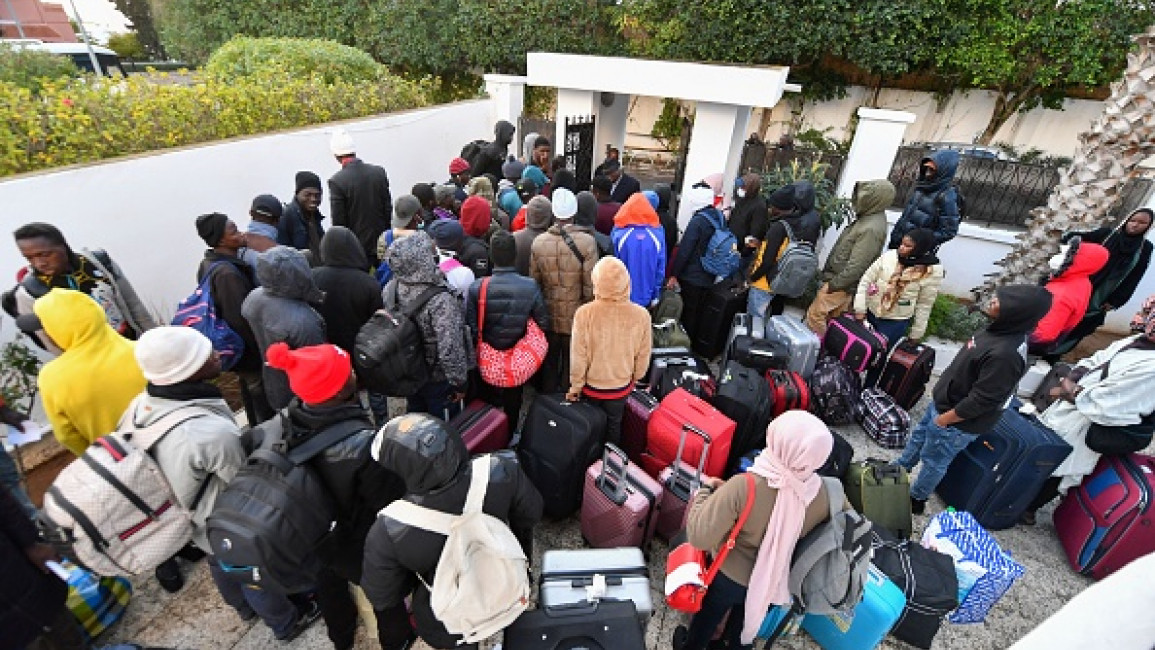Hundreds of migrants flee Tunisia after president's crackdown
Some 300 West African migrants were set to leave Tunisia on repatriation flights Saturday, fearful of a wave of violence since President Kais Saied delivered a controversial tirade last month.
In his February 21 speech, Saied ordered officials to take "urgent measures" to tackle irregular migration, claiming without evidence that "a criminal plot" was underway "to change Tunisia's demographic makeup".
Saied charged that migrants were behind most crime in the North African country, fuelling a spate of sackings, evictions and physical attacks against the community.
The African Union expressed "deep shock and concern at the form and substance" of Saied's remarks, while governments in sub-Saharan Africa scrambled to organise the repatriation of hundreds of fearful nationals who flocked to their embassies for help.
A first group of 50 Guineans were flown home on Wednesday, while Ivory Coast and Mali prepared to repatriate a combined 295 of their citizens on special flights on Saturday, diplomats and community organisers said.
"145 people are leaving this morning after having spent the night in hotels," Jean Badel Gnabli, head of an association of Ivorian migrants in Tunisia, told AFP from the airport ahead of departure.
He had said earlier that the whole community was living in fear.
"They feel like they've been handed over to mob justice."
Ivorian ambassador Ibrahim Sy Savane said a total of 1,100 Ivorians have applied to be repatriated from Tunisia.
According to official figures, there are around 21,000 undocumented migrants from other parts of Africa in Tunisia, a country of about 12 million inhabitants.
The Ivorian community numbers around 7,000 people.
Michael Elie Bio Vamet, head of an Ivorian student association, said 30 students signed up for the repatriation flight despite having permits to stay in Tunisia.
"They don't feel comfortable," he told AFP by phone. "Some of them were victims of racist acts. Some are at the end of their studies, but others discontinued."
"There are attacks almost every day, threats, they are even being kicked out by landlords or physically attacked," he added.
"In the current climate of fear, many Africans have already made up their minds to leave the country."
— The New Arab (@The_NewArab) March 4, 2023
Why African migrants in Saied's Tunisia face a wave of hatred ⬇ https://t.co/KdIqorgxma
Mali has also chartered a plane to repatriate around 150 people.
Junta leader Colonel Assimi Goita has given "very firm instructions" to assist nationals who are in distress, a Malian diplomat in Tunis told AFP.
Since Saied gave his speech, rights groups have reported a spike in vigilante violence including stabbings of sub-Saharan Africans.
Guineans among the first group to be repatriated on Wednesday said they had been subjected to manhunts in Tunisia.
Ibrahima Barry, 26, spoke of a "wave of hatred without reason".
"In Tunisia, if I tell you that they are savages, it is not too strong a word," he told AFP.
Many African migrants in Tunisia lost their jobs and homes overnight.
Dozens were arrested after identity checks, and some are still being detained.
Migrants whose countries have embassies in Tunisia rushed to them seeking assistance.
The embassies of Ivory Coast and Mali provided emergency accommodation this week for dozens of their citizens who had been evicted from their homes, including young children.
Those with no diplomatic representation in Tunisia set up makeshift camps outside the Tunis offices of the International Organization for Migration.
The Association of African Students and Interns in Tunisia is recommending black international students to stay home for one more week. Yesterday, 5 female students (4 from Ivory Coast and one from Gabon) were attacked on Saturday. Authorities reassured them that the situation… https://t.co/YhzYyvPhLM pic.twitter.com/8uALJOm87l
— Mohamed Dhia Hammami - محمد ضياء الهمامي (@MedDhiaH) February 27, 2023
Among those heading home are dozens of fee-paying or scholarship students who were enrolled in Tunisian universities and in the country legally.
AESAT, an association that supports them, sent out a message this week urging them "not to go out, even to go to class, until authorities ensure we are properly protected from these attacks". The warning has been extended until Monday.
AESAT reported last month that four Ivorian students had been assaulted when they left their dorms, while a student from Gabon was attacked in her home.
Many students from sub-Saharan Africa have already flown home at their own expense, a student representative said.


![Minnesota Tim Walz is working to court Muslim voters. [Getty]](/sites/default/files/styles/image_684x385/public/2169747529.jpeg?h=a5f2f23a&itok=b63Wif2V)




![Debris near Rafic Hariri International Airport [Getty]](/sites/default/files/styles/image_330x185/public/2176162423.jpeg?h=a5f2f23a&itok=MCSK9mkM)
![An Israeli air strike on Jabalia killed teenage journalist Hassan Hamad [Screengrab/X]](/sites/default/files/styles/image_330x185/public/2024-10/hassan%20hamad1.jpg?h=c12e0b96&itok=Rd_dyCVp)
